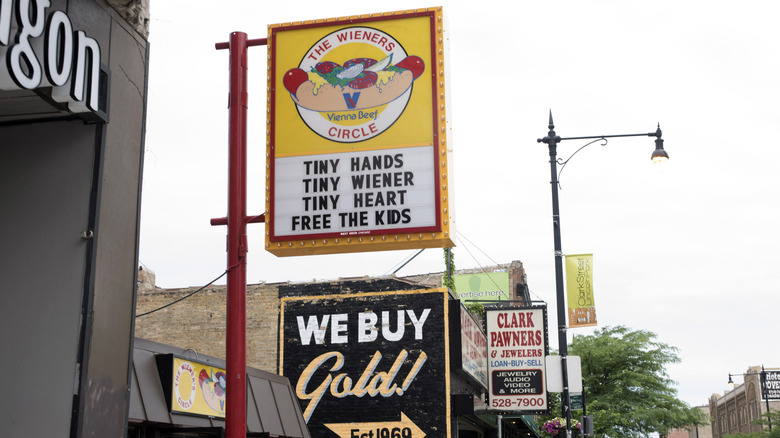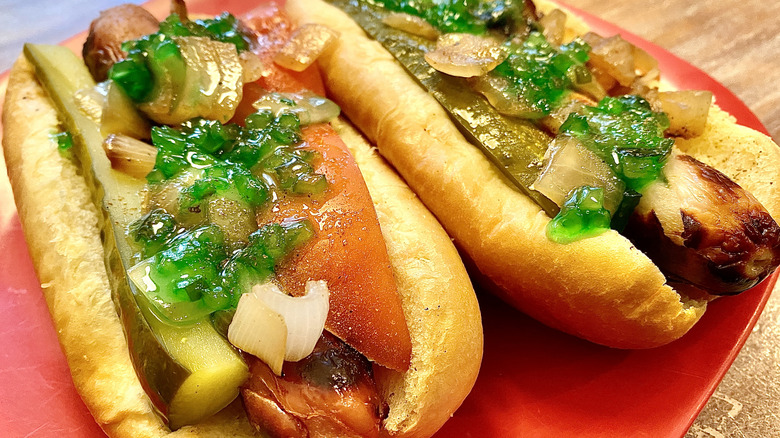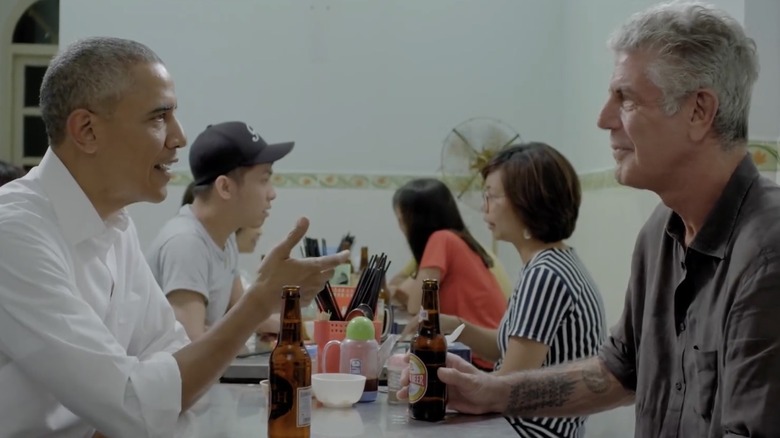The Popular Condiment Tourists In Chicago Will Get Made Fun Of For Putting On A Hot Dog
In Chicago, ketchup has been called a controversial condiment. Using it on hot dogs isn't just frowned upon; it could get you made fun of in local eateries. This is a lesson that a Chicagoan named Michelle demonstrated in a PSA for @wbbmnewsradio105.9 on TikTok. While at the Wieners Circle with her family, Michelle availed herself of the unwelcome Heinz dispenser outside. In doing so, she broke the cardinal rule of Chicago dining. "I ordered a hot dog with ketchup and that is not allowed," she explained.
Chicago prides itself on its unique, dragged-through-the-garden style of hot dogs, served with mustard, celery salt, sweet green pickle relish, sport peppers, onion, tomato wedges, and a pickle spear. When ketchup encroaches on those seven classic toppings, it invites scorn. As Bill Savage, a professor at Northwestern University, told the Chicago Tribune, "Raw vs. grilled onions. Nobody cares. Ketchup on your hot dog is the end of the world. [...] It's become this kind of Chicago identity — like if you put ketchup on your hot dog you're not really a Chicagoan."
In the video, as Michelle attempts to eat her hot dog in peace, voices can be heard calling her out with many swear words audible. Even the person who takes her order gets in on the act, telling her with attitude, "At your big age it's time to grow up." To be fair, she's dining at a hot dog stand known for a somewhat brazen attitude to customer service.
Hot dogs without ketchup are a long-held local tradition
The Wieners Circle is upfront about its 40-year history of delivering "verbal abuse" to Chicago hot dog customers. Under the stunning Chicago skyline, however, it's but one of many vendors that abide by the tradition of discouraging ketchup use on hot dogs. The tradition has also been observed at Dave's Red Hots — the city's oldest hot dog stand, opened by Jewish immigrant David Kaplan in the early 1930s. The late Irv Karm, whose family bought Dave's in 1941, recalled to the Chicago Tribune how his father and uncle only kept mustard, pickles, and peppers on hand. "They refused to put in anything else," he explained, "because my father said anything else ruins that taste of the hot dog."
"Just before he sold the business," Karm continued, "the neighborhood had changed and people started asking for ketchup, which really upset my father. They asked for it so frequently that he brought in the little individual packages of Heinz ketchup. But he would charge a nickel for a package."
The Heinz brand has continued causing trouble in the Windy City well into the 21st century. In 2017, it tried marketing its ketchup locally with the tongue-in-cheek name "Chicago Dog Sauce." In 2024, it made an even more direct provocation by putting up free ketchup dispensers outside businesses like the Wieners Circle. Gina Fountain, the current owner of Dave's Red Hots (which still draws long lines), begrudgingly offers Red Gold ketchup packets instead.
Why Chicago is so ketchup-averse
In 1991, 50 years after Irv Karm's family bought Dave's Red Hots, the Chicago Reader explained the city's aversion to ketchup on hot dogs in a similar way. It contended that ketchup contains too much sugar and detracts from the natural flavor of the tomatoes in a Chicago-style dog. The argument is that its sugary quality makes it palatable for kids, like Velveeta cheese, but not fit for an adult hot dog connoisseur.
Whether you agree or disagree, the idea is that you should be getting something a little different with a Chicago dog than you would in any other backyard cookout. When tourists go against that, they risk alienating locals and the no-ketchup custom they've affected for decades. If nothing else, you might share their discomfort as they tease you for playing into Heinz's hands while checking hot dogs off your Chicago bucket list.
For an out-of-towner, this could make Chicago feel like a ketchup police state, but if you take it in the spirit of a half-serious joke, it's all in good fun. Even Clint Eastwood's famous movie cop, Dirty Harry, had a hardline stance against ketchup, and his jurisdiction was San Francisco. Cross-reference "Sudden Impact," the same film that spawned the well-known quote, "Go ahead, make my day." With the Golden Gate Bridge in the background, Harry says, "Nobody, and I mean nobody, puts ketchup on a hot dog." Not in his town, and not in Chicago, either.
Cosigned by Anthony Bourdain and Barack Obama
Hot dogs are one food featured in the Chicago episode of "The Layover," where you can see how to spend one day in this city, according to Anthony Bourdain. Jimmy's Red Hots, the local hot dog stand Bourdain visited, proudly advertises that it's been serving "No ketchup since 1954." On its website, the stand explains that a core value of its founder (the original Jimmy) was "Never put ketchup on a Chicago-style hot dog." They continue to adhere to that, and it isn't just a casual policy. In "The Layover," you can see anti-ketchup signs on the wall at Jimmy's, telling customers, "Don't even ask!" and, "Don't even think about it!!"
Despite the different neighborhoods in Chicago and the variations on toppings like relish, Bourdain said, "No one disagrees about the ketchup thing. That's just wrong." He confirmed this on "Parts Unknown" with former U.S. president, Illinois senator, and Chicago law professor, Barack Obama. When they sat down for a meal, Bourdain asked, "Is ketchup ever acceptable on a hot dog?" Speaking as a Chicagoan, Obama said, "It's not acceptable past the age of 8." As president, he never signed an executive order outlawing ketchup on hot dogs, but it's clear there's an unwritten rule about that in Chicago even to this day. Unless you're an 8-year-old at heart who's fine with a local possibly telling you to "grow up," maybe leave the Heinz ketchup off your Chicago-style hot dog.



